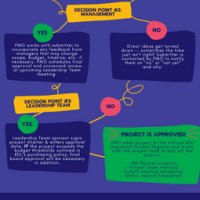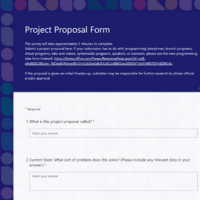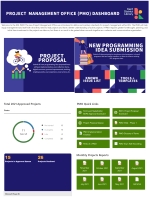Project Management Office for Strategy and ROI
Kent District Library
Innovation Synopsis
The new Project Management Office (PMO) at KDL provides a transparent and equitable process for handling new project ideas while monitoring overall organizational capacity in a large library system with 20 branches, thereby ensuring organizational focus and delivering completed projects that are on time, on budget and within scope.
Challenge/Opportunity
Staff hours and budgets are fixed, so keeping a finger on the pulse of organizational capacity is imperative. Before the PMO, KDL had more than 165 active projects with many that were stalled or lacking strategic alignment. Staff were overextended and often confused trying to keep up with myriad new initiatives, of which some had no clear leader; however, with the advent of the PMO, KDL now has an average of 12 active projects (one to two per sponsor at a time) that effectively and efficiently invest in innovation.
Key Elements of Innovation
The primary outcome of the PMO is that it creates a clear pathway for ideas to evolve into projects. This process starts with first level stakeholder review to shape the project scope and ensure a cross-functional team. Then, management approves and screens for strategic alignment, strengths, opportunities and risks before KDL Leadership gives the final approval. Each project is then assigned a sponsor, who helps clear obstacles and reports back monthly to the PMO and Board of Trustees.
Achieved Outcomes
All new initiatives with budgetary implications and/or multi-branch and department impact use the PMO process. From February 2021 (launch) to present, the PMO has seen:
- 62 project proposals submitted
- 40 projects approved
- 22 projects declined
- 27 projects completed
- 13 projects in process
Anecdotal Outcomes:
- Reduced time for annual budget sessions (focal points are guided by projects in the queue)
- Increased organizational awareness of active projects
- No “rogue” projects (started without prior approval)



